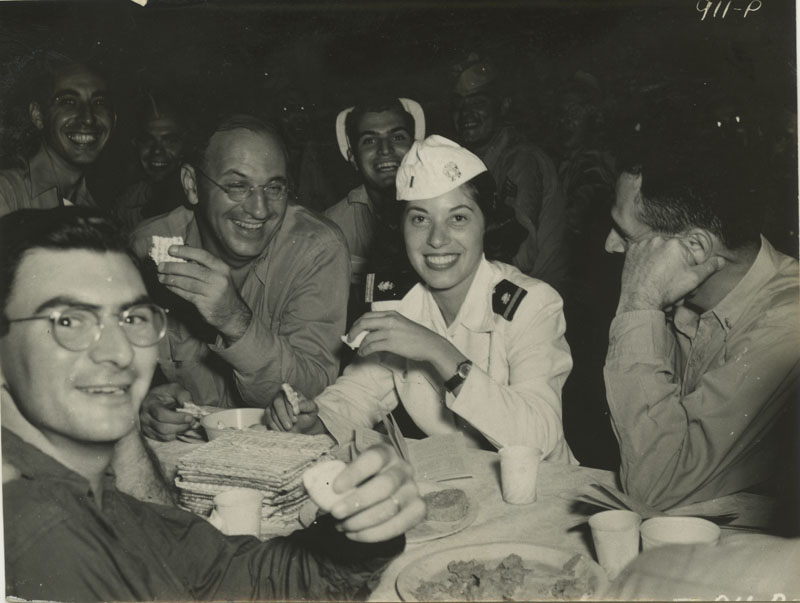| Contribute a translation | Source (English) |
|---|---|
For what shall we pray, O Lord? For strength, for victory, for a swift peace? Certainly! | |
But we pray also to be worthy of the faith of our loved ones. | |
We seek help that our souls shall not be corroded by the grim work that we must do. | |
Above all, give us light to see that our sacrifices are made for Thee. | |
Amen. |
This prayer by Rabbi Dr. Philip S. Bernstein, then President of the Central Conference of American Rabbis, was included in the anthology of prayer, The Prayer Book of the Armed Forces (ed. Daniel A. Poling, 1951), p. 11.
Source(s)


“Prayer for Armed Forces in Combat, by Rabbi Dr. Philip S. Bernstein (1951)” is shared through the Open Siddur Project with a Creative Commons Public Domain Dedication 1.0 Universal license.
Philip Sidney Bernstein (June 29, 1901 – December 3, 1985) was a Reform rabbi who served as the advisor to the U.S. Army during World War II. After the war he helped find homes for over 200,000 displaced Jews. Born in Rochester, New York he went on to study at Syracuse University and the Jewish Institute of Religion. At the age of 25, in 1926, Bernstein returned to Rochester to serve as assistant rabbi of Temple B'rith Kodesh. Within the year he was made rabbi and continued there until the late 1960s. As rabbi, Bernstein began fighting antisemitism; exemplified by his correspondence with his acquaintance Cardinal Edward Mooney. Bernstein requested the Cardinal join him in combating Father Charles Coughlin and his antisemitic National Union for Social Justice. During World War II Bernstein, acted as the official advisor on Jewish affairs to United States Army commanders in Europe, relating the stories of the Holocaust to the United States beginning in 1943. After the war, Bernstein assisted in resettling over 200,000 displaced European Jews. At the petition of Orthodox Jews living in displaced persons' camps, he adopted their proposition that copies of the Talmud should be printed to help support Jewish education in the refugee camps. In the 1950s and 60s, Bernstein served as the president of the Central Conference of American Rabbis and chairman of the American Israel Public Affairs Committee.
Aharon Varady (M.A.J.Ed./JTSA Davidson) is a volunteer transcriber for the Open Siddur Project. If you find any mistakes in his transcriptions, please let him know. Shgiyot mi yavin; Ministarot naqeni שְׁגִיאוֹת מִי־יָבִין; מִנִּסְתָּרוֹת נַקֵּנִי "Who can know all one's flaws? From hidden errors, correct me" (Psalms 19:13). If you'd like to directly support his work, please consider donating via his Patreon account. (Varady also translates prayers and contributes his own original work besides serving as the primary shammes of the Open Siddur Project and its website, opensiddur.org.)
Stable Link:
https://opensiddur.org/?p=44905
Associated Image:
(This image is set to automatically show as the "featured image" in shared links on social media.)
Re-formatted:
ODT
Terms of Use:
Be a mentsch (a conscientious, considerate person) and adhere to the following guidelines:
- Properly attribute the work to Philip S. Bernstein and Aharon N. Varady (transcription).
- Clearly indicate the date you accessed the work and in what ways, if any, you modified it. (If you have adapted the work, let us know so that the contributor might consider endorsing your revision.)
- Provide the stable link to this resource: <https://opensiddur.org/?p=44905>.
- Indicate that the original work was shared under the Creative Commons Zero (CC 0) Universal license a Public Domain dedication. (To redistribute or remix this work in any format, modified or unmodified, you must refer to the terms of the license under which the work is shared.)
Additional Notes:
- The views expressed in this work represent the views of their creator(s) and do not necessarily represent the views of the Open Siddur Project's developers, its diverse community of volunteer contributors, or its institutional partners.
- We strongly advise against printing sacred texts and art containing divine names as these copies must be regarded with reverence, complicating their casual treatment and disposal.
- If you must dispose of a printed sacred text (one containing Divine Names), please locate the closest genizah (often established by a synagogue) and contact its custodians for further instructions. We also recommend using Morah Yehudis Fishman's Prayer for Adding a Work to the Genizah.
Support this work:
The Open Siddur Project is a volunteer-driven, non-profit, non-commercial, non-denominational, non-prescriptive, gratis & libre Open Access archive of contemplative praxes, liturgical readings, and Jewish prayer literature (historic and contemporary, familiar and obscure) composed in every era, region, and language Jews have ever prayed. Our goal is to provide a platform for sharing open-source resources, tools, and content for individuals and communities crafting their own prayerbook (siddur). Through this we hope to empower personal autonomy, preserve customs, and foster creativity in religious culture.
ויהי נעם אדני אלהינו עלינו ומעשה ידינו כוננה עלינו ומעשה ידינו כוננהו "May the pleasantness of אדֹני our elo’ah be upon us; may our handiwork be established for us — our handiwork, may it be established." –Psalms 90:17










Leave a Reply